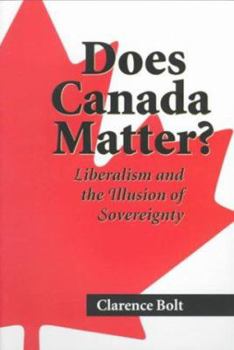Does Canada Matter?: Liberalism and the Illusion of Sovereignty
In this lucid yet impassioned book Clarence Bolt reveals how Canada is rapidly losing its sovereign status to the liberal, globalizing drive that has, since Confederation, endeavoured to eliminate regional diversity, self-reliance and distinctiveness by blending our regions into a centralized economic and political system. Echoing George Grant, Bolt proposes that Canada can remain a unique, sovereign state only by fostering sustainable regional units...
Format:Paperback
Language:English
ISBN:0921870647
ISBN13:9780921870647
Release Date:February 1999
Publisher:Ronsdale Press
Length:216 Pages
Weight:0.73 lbs.
Dimensions:0.6" x 6.1" x 9.0"
Customer Reviews
1 rating
Reclaiming involvement in community politics
Published by Thriftbooks.com User , 24 years ago
Clarence Bolt, Does Canada Matter? Liberalism and the Illusion of Sovereignty. Vancouver: Ronsdale Press, 1999. Clarence Bolt has written a thought-provoking essay on politics and development in Canada. Ronsdale Press does a service to a general readership by making available this college professor's synthesis of the thinking of many well-known writers on the subject of contemporary Canadian economic politics. From newspaper, radio, and television programs over the past five years, these names are familiar to the most average layperson: Maude Barlow, Richard Gwyn, Mel Hurtig, and Linda McQuaig. Reference to these authors gives the reader a quick orientation about Bolt's values and position as critic about much of the results of liberalism throughout the entire history of Canada. Most valuable, is his incorporation of George Grant's philosophy into his own argument. It's been said before that Grant, a Canadian philosopher, was due for a come-back. The main argument of Does Canada Matter? can be found in quotes such as the following: "The liberal values and practices to which Canadians have been committed since confederation... have created a way of life which sacrifices regional and community uniqueness... and produces political apathy among residents by rendering local and regional politics virtually meaningless." In the thinking of George Grant, Bolt writes that "the shared commitment by Canadians and Americans to modern technology with its homogenizing tendencies" has replaced the classic definition of a good life as identified by "politics, community, friendship and family." Early in his book, Bolt introduces a concept of automobile culture, then returns to it quite often to explain such specific issues as urban development and the economic and philosophical motivations of growth and development. By automobile culture, he means the enormous amount of money and land that local, regional, provincial, federal governments must commit to the building of roads, parking lots, and naturally, taking what was in most cases very productive farm land out of production in order to support these infrastructures. "Industrial countries such as Canada solve this problem by importing ever-increasing amounts of less safe food from less reliable sources, delivered by transportation systems (truck, rail, or air) which, ironically, are largely responsible for the inappropriate use of local land (and loss of food-producing capabilities) in the first place." As a result, governments have fewer dollars for the social welfare issues that should be their main concern, their priorities are set by factors outside their own communities, and region is pitted against region across Canada for federal dollars. "By the 1980s, fully one-third of the land of major Canadian cities was devoted to parking, and another twenty percent to roads, lanes, and alleys. City residents (often the poor who could not aff






